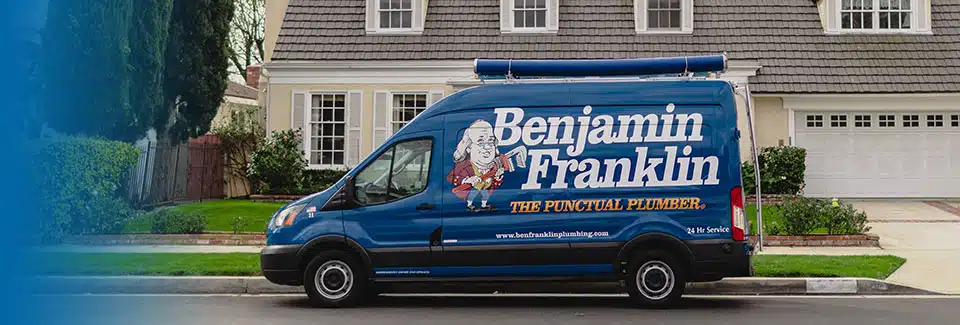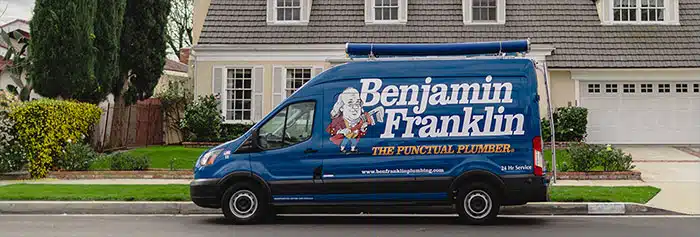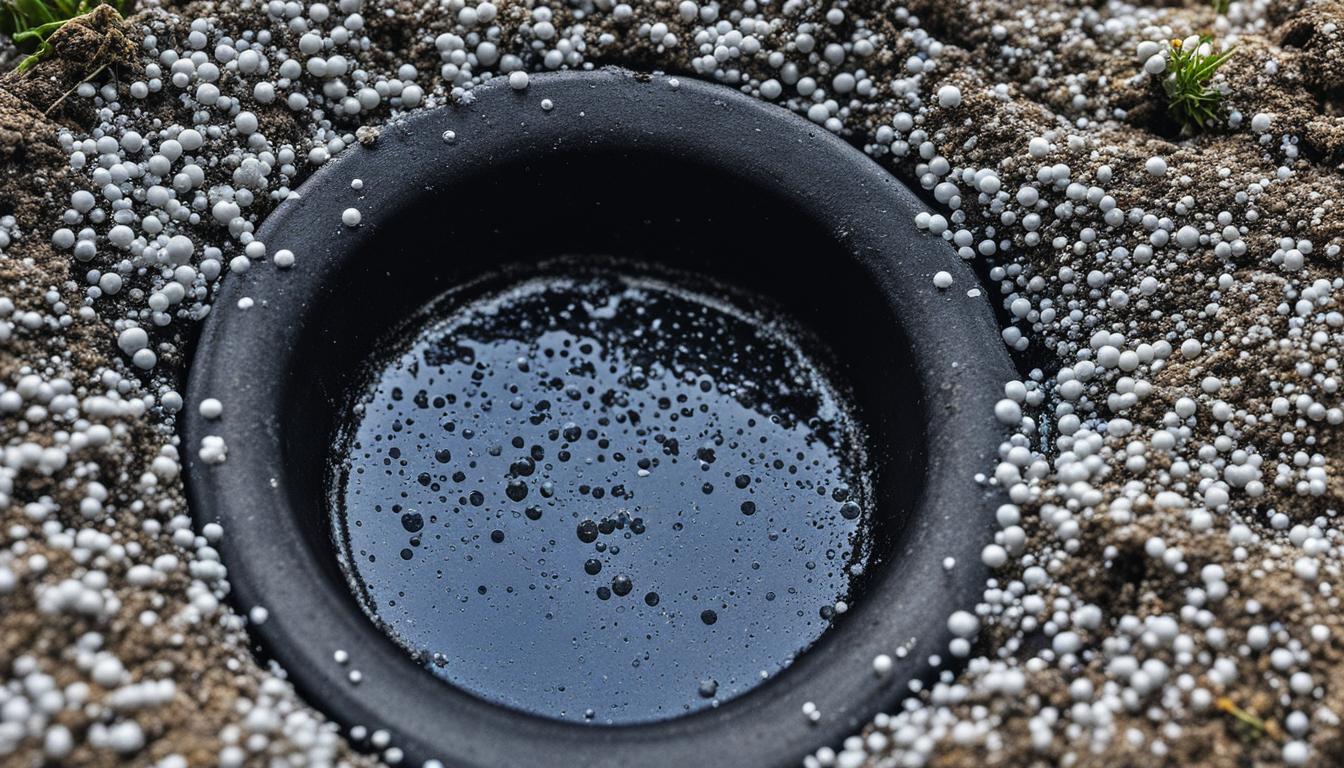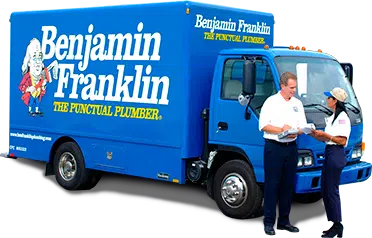Have you ever wondered if you can unclog your drains using common household items? Baking soda and vinegar are often suggested as a natural solution for drain unclogging. But do they really work? In this article, we’ll explore the science behind using baking soda and vinegar to unclog drains and whether or not it’s an effective and eco-friendly method.
Key Takeaways:
- Using baking soda and vinegar is a popular DIY method for drain unclogging.
- The chemical reaction between baking soda and vinegar can create a foaming action that may help break up some clogs.
- The effectiveness of baking soda and vinegar for drain unclogging depends on the nature and severity of the clog.
- Baking soda and vinegar are natural, non-toxic alternatives to commercial drain cleaners.
- Consider stronger alternatives to baking soda and vinegar for tougher clogs or older plumbing systems.
The Science Behind Baking Soda and Vinegar for Drain Unclogging
Baking soda, or sodium bicarbonate, is a base, while vinegar is a weak acid. When these two ingredients are combined, a chemical reaction occurs, resulting in carbon dioxide gas formation and the production of water. This reaction can create a fizzy foam that may help break up some clogs in drains.
However, the effectiveness of baking soda and vinegar in unclogging drains depends on the nature of the clog and the severity of the blockage. It’s important to understand when and how to use baking soda and vinegar for optimal results.
Understanding the Chemical Reaction
The chemical reaction between baking soda and vinegar involves an acid-base neutralization reaction. Baking soda, being a base, reacts with the acetic acid present in vinegar, resulting in the formation of carbon dioxide gas and water. The production of carbon dioxide gas creates a foaming action, which can help dislodge or break up some clogs in drains.
It’s important to note that while the reaction produces carbon dioxide gas, it is not a high-pressure reaction and should not be used as a substitute for professional plumbing services in severe clog cases.
Effectiveness in Common Clogs
The effectiveness of baking soda and vinegar in unclogging drains can vary depending on the type of clog. They tend to work best on organic material and softer clogs such as hair, grease, and soap scum. These substances can be broken down by the alkaline properties of baking soda and the acidic properties of vinegar.
However, for more stubborn or severe clogs, such as those caused by mineral buildup or foreign objects, baking soda and vinegar may not be as effective. In such cases, professional intervention or the use of commercial drain cleaners may be necessary.
When to Use Baking Soda and Vinegar
Baking soda and vinegar can be used as a preventive measure to maintain the cleanliness and proper flow of drains. Regularly pouring a mixture of baking soda and vinegar down the drain followed by hot water can help prevent the accumulation of small clogs and keep your drains running smoothly.
They can also be used as an initial attempt for unclogging drains before resorting to more aggressive methods. If you notice slow drainage or minor clogs, trying the baking soda and vinegar method can be a safe, eco-friendly, and cost-effective option to start with.
Remember that while baking soda and vinegar can be effective in some cases, they are not a universal solution for all drain clogs. It’s crucial to assess the severity and nature of the clog before deciding on the best course of action for unclogging your drain.
How to Unclog Drains with Baking Soda and Vinegar
Unclogging drains with baking soda and vinegar involves a simple and effective process. By following these step-by-step instructions, you can use these common household ingredients to clear stubborn clogs and keep your drains flowing smoothly.
Here’s how to unclog drains with baking soda and vinegar:
- Start by pouring a pot of boiling water down the drain. This helps clear away any loose debris and prepares the drain for the next steps.
- Mix 1/2 cup of baking soda with 1/2 cup of vinegar in a measuring cup or bowl. The combination of these two ingredients will create a foaming reaction that can help break up clogs.
- Quickly pour the baking soda and vinegar mixture down the drain. Be prepared for some fizzing and foaming as the ingredients interact with any blockages in the drain.
- Allow the mixture to sit in the drain for about 30 minutes. This gives it time to penetrate and loosen the clog.
- After the waiting period, flush the drain with another pot of boiling water. This will help wash away any remaining debris and ensure that the drain is clear.
Using baking soda and vinegar to unclog drains is a cost-effective and eco-friendly alternative to harsh chemical drain cleaners. This natural solution can be used regularly to maintain healthy drains and prevent future clogs.
Remember, while baking soda and vinegar can be effective for certain types of clogs, they may not work in all situations. If you’re dealing with a stubborn or severe blockage, it may be best to consult a professional plumber or consider stronger alternatives.
Follow these simple steps and you’ll be able to unclog drains with baking soda and vinegar in no time.
Benefits of Using Baking Soda and Vinegar to Unclog Drains
Using baking soda and vinegar to unclog drains offers several benefits. Firstly, these ingredients are natural and non-toxic, making them safe for the environment and your health. Unlike commercial drain cleaners that often contain harsh chemicals, baking soda and vinegar provide a gentle yet effective solution for clearing clogs. You can have peace of mind knowing that you are not exposing yourself or the environment to harmful substances.
Additionally, baking soda and vinegar are cost-effective alternatives to commercial drain cleaners. These common household items are readily available in most kitchens and can save you money compared to purchasing expensive chemical products. By using baking soda and vinegar, you can unclog drains without breaking the bank.
Moreover, regular use of baking soda and vinegar for drain maintenance can help maintain the health of your pipes. The fizzing action of the chemical reaction between these ingredients can help break down buildup and prevent future clogs. By incorporating baking soda and vinegar into your regular cleaning routine, you can keep your plumbing system in good condition and avoid costly repairs.
| Benefits of using baking soda and vinegar to unclog drains: |
|---|
| 1. Natural and non-toxic |
| 2. Cost-effective solution |
| 3. Helps maintain pipe health |
DIY Drain Cleaning with Baking Soda and Vinegar vs. Commercial Solutions
While baking soda and vinegar can be effective in some cases, it’s important to compare their efficacy with commercial drain cleaners. Commercial solutions often contain stronger chemicals that can dissolve tough clogs more effectively. Additionally, there are risks associated with using baking soda and vinegar, such as potential damage to older pipes and the messy clean-up they can create. Knowing when to consider stronger alternatives to baking soda and vinegar is crucial for maintaining the proper functionality of your plumbing system.
If you’re dealing with a stubborn or severe clog, commercial drain cleaners may provide a more practical and efficient solution. These products are specifically formulated to tackle tough blockages, making them highly effective in clearing drains. The potent chemical ingredients in commercial cleaners can dissolve and break down various types of clogs, including hair, grease, and soap scum.
However, it’s important to note that the use of commercial drain cleaners also comes with certain risks. These powerful chemicals can be harmful if not used correctly, posing health hazards and potential damage to your plumbing system. In addition, some commercial cleaners may contain harsh ingredients that can cause corrosion or negatively impact the environment.
When considering whether to use baking soda and vinegar or commercial solutions, it’s crucial to assess the severity of the clog and the condition of your plumbing system. If you’re dealing with a minor or moderate clog, using baking soda and vinegar as a natural and eco-friendly DIY option can be a safe and effective choice. However, for stubborn or severe clogs, it may be necessary to opt for commercial drain cleaners.
Remember, prevention is always better than dealing with clogged drains. Regular maintenance and proper disposal of food waste, grease, and other potential clog-causing materials can help minimize the risk of blockages. If you’re unsure about what approach to take, it’s best to consult a professional plumber who can assess your specific situation and recommend the most appropriate drain cleaning method.
Conclusion
In conclusion, baking soda and vinegar can be a viable DIY solution for unclogging drains in certain situations. The chemical reaction between these two ingredients can help break up some clogs and clear drains effectively. However, it is important to consider the type and severity of the clog to gauge their effectiveness.
When using baking soda and vinegar, it is crucial to weigh the benefits against potential risks. These natural ingredients offer an eco-friendly and non-toxic option for drain unclogging, making them a safe choice for both the environment and your health. Additionally, they are cost-effective and readily available, providing a budget-friendly alternative compared to commercial drain cleaners.
While baking soda and vinegar can be effective, it’s essential to acknowledge their limitations. In some cases, tougher and more stubborn clogs may require stronger alternatives, such as commercial drain cleaners that contain powerful chemicals designed for breaking down and dissolving tough obstructions. Additionally, older pipes may be susceptible to damage from the chemical reaction, so it’s important to exercise caution when using baking soda and vinegar.
In summary, baking soda and vinegar offer a natural, eco-friendly, and affordable solution for unclogging drains in specific scenarios. By understanding their effectiveness, benefits, and potential risks, you can make an informed decision on whether to utilize them or consider stronger alternatives for your drain cleaning needs.
FAQ
Does baking soda and vinegar unclog drains?
Baking soda and vinegar are commonly suggested as a DIY solution for unclogging drains.
What is the science behind baking soda and vinegar for drain unclogging?
Baking soda is a base, while vinegar is a weak acid. When these two ingredients are combined, they create a chemical reaction that can help break up some clogs and clear drains.
How do you unclog drains with baking soda and vinegar?
To unclog drains with baking soda and vinegar, you pour a pot of boiling water down the drain, then mix baking soda and vinegar to create a foaming reaction and pour this mixture into the drain. After letting it sit for a few minutes, you flush the drain with more boiling water.
What are the benefits of using baking soda and vinegar to unclog drains?
Using baking soda and vinegar for drain unclogging is natural, non-toxic, and safe for the environment. It is also an affordable and readily available solution compared to commercial drain cleaners. Regular use of baking soda and vinegar can help keep pipes clean and prevent future clogs.
How does DIY drain cleaning with baking soda and vinegar compare to commercial solutions?
While baking soda and vinegar can be effective in some cases, commercial solutions often contain stronger chemicals that can dissolve tough clogs more effectively. There are also risks associated with using baking soda and vinegar, such as potential damage to older pipes and messy clean-up.
When should I consider using stronger alternatives to baking soda and vinegar for drain cleaning?
It’s important to consider stronger alternatives to baking soda and vinegar when dealing with stubborn or severe clogs, as well as when older pipes are present. Consult a professional if you are unsure about using DIY solutions.







